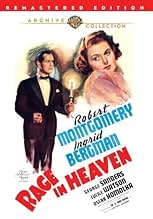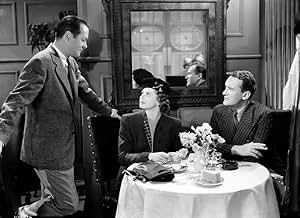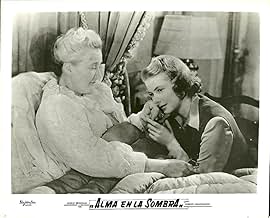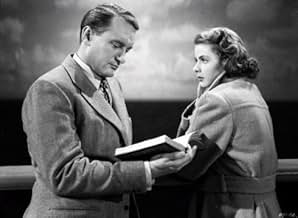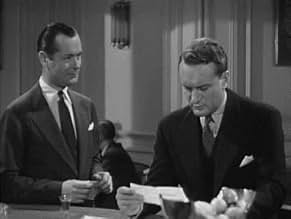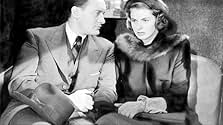NOTE IMDb
6,4/10
1,4 k
MA NOTE
Ajouter une intrigue dans votre langueRobert Montgomery and George Sanders team up to play against type in this probing psychological thriller that features Ingrid Bergman as the object of their obsessions.Robert Montgomery and George Sanders team up to play against type in this probing psychological thriller that features Ingrid Bergman as the object of their obsessions.Robert Montgomery and George Sanders team up to play against type in this probing psychological thriller that features Ingrid Bergman as the object of their obsessions.
- Réalisation
- Scénario
- Casting principal
- Récompenses
- 3 victoires au total
Frederick Worlock
- Solicitor-General
- (as Frederic Worlock)
Ludwig Hardt
- Durand
- (as Ludwig Hart)
Stuart Hall
- Traveling Salesman
- (scènes coupées)
Major McBride
- Bank Clerk
- (scènes coupées)
Clive Morgan
- Traveling Salesman
- (scènes coupées)
Joseph North
- Undertaker
- (scènes coupées)
Wyndham Standing
- Dr. McTernan
- (scènes coupées)
Harry Allen
- Jury Foreman
- (non crédité)
Avis à la une
This film, based on a James Hilton novel, is not often seen these days. In part, the material Christopher Isherwood extracted from the book doesn't make a good movie. As directed by W. S. Van Dyke, the film seems to have been sabotaged by its star, Robert Montgomery, who made no secret he didn't want to be in the picture. It's a shame because the rest of the players are evidently acting in a different movie.
The melodrama has some interesting things going for it. First there is the luminous appearance of Ingrid Bergman in her third Hollywood film. Also, George Sanders has one of the best roles he ever played in the movies. Both Ms. Bergman and Mr. Sanders are the reason for watching. Lucile Watson, Oscar Homolka and Philip Merivale, among others, make great contributions to the film.
While this is not by any means a horrible film, it could have been improved if only Mr. Montgomery, a welcome presence in any movie, would have done a better job inter acting with the rest and following direction.
The melodrama has some interesting things going for it. First there is the luminous appearance of Ingrid Bergman in her third Hollywood film. Also, George Sanders has one of the best roles he ever played in the movies. Both Ms. Bergman and Mr. Sanders are the reason for watching. Lucile Watson, Oscar Homolka and Philip Merivale, among others, make great contributions to the film.
While this is not by any means a horrible film, it could have been improved if only Mr. Montgomery, a welcome presence in any movie, would have done a better job inter acting with the rest and following direction.
This psychological thriller involved a leading man who was brooding over his perceived mistreatment by MGM (Robert Montgomery), and a director, Woody Van Dyke, who was having a difficult physical and emotional time of it to the point that two other directors had to get involved. And yet it worked overall, although I feel it could have pulled together better than it did with a more cohesive vision.
Montgomery had said he was not going to act in this one, just read his lines. Yet his detached demeanor actually works as he is portraying Phillip Monrell, a man whose paranoia comes out of nowhere. He is the charming Robert Montgomery character of the high society comedies for the first 30 minutes of the film. And then becomes - without explanation - very paranoid. He has been overseas, only to return to England, meet, and marry his ailing mother's paid companion, Stella Bergen (Ingrid Bergman), in a whirlwind courtship. Ingrid you have to stop marrying in haste! You got lucky with Victor Lazslo in "Casablanca", but not this time!
And Monrell is most of all jealous of his long time "friend", engineer Ward Andrews (George Sanders). He begins to think his wife and Ward are having an affair. And this seems laughable as Sanders is for once portraying somebody who is admirable and completely guileless. Or is he??
There is a mystery patient at an insane asylum who escapes at the beginning of the film. You never see his face. And this never comes up until the end when a doctor there, Oscar Homolka, shows up at a crucial juncture. He is a very welcomed presence as he assaults a shopkeeper with his umbrella so an important phone call can be made.
Definitely worth watching. But there is just an odd lack of chemistry between the leads.
Montgomery had said he was not going to act in this one, just read his lines. Yet his detached demeanor actually works as he is portraying Phillip Monrell, a man whose paranoia comes out of nowhere. He is the charming Robert Montgomery character of the high society comedies for the first 30 minutes of the film. And then becomes - without explanation - very paranoid. He has been overseas, only to return to England, meet, and marry his ailing mother's paid companion, Stella Bergen (Ingrid Bergman), in a whirlwind courtship. Ingrid you have to stop marrying in haste! You got lucky with Victor Lazslo in "Casablanca", but not this time!
And Monrell is most of all jealous of his long time "friend", engineer Ward Andrews (George Sanders). He begins to think his wife and Ward are having an affair. And this seems laughable as Sanders is for once portraying somebody who is admirable and completely guileless. Or is he??
There is a mystery patient at an insane asylum who escapes at the beginning of the film. You never see his face. And this never comes up until the end when a doctor there, Oscar Homolka, shows up at a crucial juncture. He is a very welcomed presence as he assaults a shopkeeper with his umbrella so an important phone call can be made.
Definitely worth watching. But there is just an odd lack of chemistry between the leads.
"Rage in Heaven" belongs to the spate of Freudian movies of the forties: Hitchcock's "spellbound" Lang's "secret beyond the door" Tourneur's "cat people" Stahl's "leave her to heaven" Siodmak's "dark mirror" ,the list is endless.
"Rage in heaven" is an excellent underrated thriller.Although Philip's mother part is underwritten ,she predates the Hitchcockian mums ,those of "Notorious" "Strangers on a train" "Marnie" etc.Robert Montgomery whose character is the most interesting portrays a rich kid,probably victim of his over possessive mother -"he's more attractive than Ward" - A selfish paranoiac man who will not be satisfied till he destroys everything.His behavior makes sense:the cat,then the best friend (the enemy ,for his wife is in love with him),the wife and finally himself ,the doctor explains.
The screenplay might not be thoroughly original,but "Leave her to heaven" (1946) borrows Gene Tierney's diabolical suicide from it,and the final search has something of Cornell Woolrich (aka William Irish) ,notably his "phantom lady".
Three excellent actors,and a gripping story: you will not waste your time.
"Rage in heaven" is an excellent underrated thriller.Although Philip's mother part is underwritten ,she predates the Hitchcockian mums ,those of "Notorious" "Strangers on a train" "Marnie" etc.Robert Montgomery whose character is the most interesting portrays a rich kid,probably victim of his over possessive mother -"he's more attractive than Ward" - A selfish paranoiac man who will not be satisfied till he destroys everything.His behavior makes sense:the cat,then the best friend (the enemy ,for his wife is in love with him),the wife and finally himself ,the doctor explains.
The screenplay might not be thoroughly original,but "Leave her to heaven" (1946) borrows Gene Tierney's diabolical suicide from it,and the final search has something of Cornell Woolrich (aka William Irish) ,notably his "phantom lady".
Three excellent actors,and a gripping story: you will not waste your time.
The first half of this film is a fascinating portrayal of a Paranoid Psychopath. The second half deteriorates into an in-earnest attempt to deliver a thoughtful look at someone suffering from this form of mental illness.
Ingrid Bergman, in her third Hollywood feature, is the subject of a dangerous obsession from her husband, a wealthy heir, who lacks self-esteem and lives in a constant state of jealously and prone to being easily agitated. Robert Montgomery plays the ticking bomb.
Parenthetically, Montgomery was reportedly unhappy the studio demanded he play the role because he wanted time off and therefore delivered his lines quickly and without much effort. I found this to be, ironically, effective for the character.
The great George Sanders plays the man in most danger of the lead character's pathological illness. Unfortunately, his character is given little to work with in the third act of the film.
There's a scene where a trial is held and the apathy displayed by Sanders (with the exception of one shot) is astonishing.
In the 1940s Hollywood began its fascination with stories focused on psychology. This is one of the first films in that era and unfortunately it was put in the hands of director W. S. Van Dyke, who had the reputation of working quickly and was nicknamed "One-Take Van Dyke." You can see characters trip over lines and a lack of care over the story's plot line.
Oscar Homolka seriously overplays the mental health doctor in the picture. Clearly the rage over the film's miscues should be directed at Van Dyke.
Ingrid Bergman, in her third Hollywood feature, is the subject of a dangerous obsession from her husband, a wealthy heir, who lacks self-esteem and lives in a constant state of jealously and prone to being easily agitated. Robert Montgomery plays the ticking bomb.
Parenthetically, Montgomery was reportedly unhappy the studio demanded he play the role because he wanted time off and therefore delivered his lines quickly and without much effort. I found this to be, ironically, effective for the character.
The great George Sanders plays the man in most danger of the lead character's pathological illness. Unfortunately, his character is given little to work with in the third act of the film.
There's a scene where a trial is held and the apathy displayed by Sanders (with the exception of one shot) is astonishing.
In the 1940s Hollywood began its fascination with stories focused on psychology. This is one of the first films in that era and unfortunately it was put in the hands of director W. S. Van Dyke, who had the reputation of working quickly and was nicknamed "One-Take Van Dyke." You can see characters trip over lines and a lack of care over the story's plot line.
Oscar Homolka seriously overplays the mental health doctor in the picture. Clearly the rage over the film's miscues should be directed at Van Dyke.
Lighten up reviewer and enjoy this movie for what it is. Good Old fashioned entertainment. I've watched this movie man times and always enjoy it. Aubrey Mather as Clark is worth the admission price.
Le saviez-vous
- AnecdotesW.S. Van Dyke took over the direction of the movie from Robert B. Sinclair, who became ill shortly after shooting began. Van Dyke was in the Marines, but was granted a 14-day leave to finish the picture. Neither Sinclair nor Van Dyke was available for re-takes, which were then directed by Richard Thorpe.
- GaffesThe movie commences with a quote, "Heaven hath no rage like love to hatred turned", which it attributes to Milton. The quote is in fact from William Congreve's play "The Mourning Bride".
- Citations
Stella Bergen: My life is like this clearing. Nice and peaceful with paths leading in all directions. Only, I don't know which one to take.
- ConnexionsFeatured in Ingrid (1984)
Meilleurs choix
Connectez-vous pour évaluer et suivre la liste de favoris afin de recevoir des recommandations personnalisées
- How long is Rage in Heaven?Alimenté par Alexa
Détails
- Durée
- 1h 25min(85 min)
- Couleur
- Rapport de forme
- 1.37 : 1
Contribuer à cette page
Suggérer une modification ou ajouter du contenu manquant


